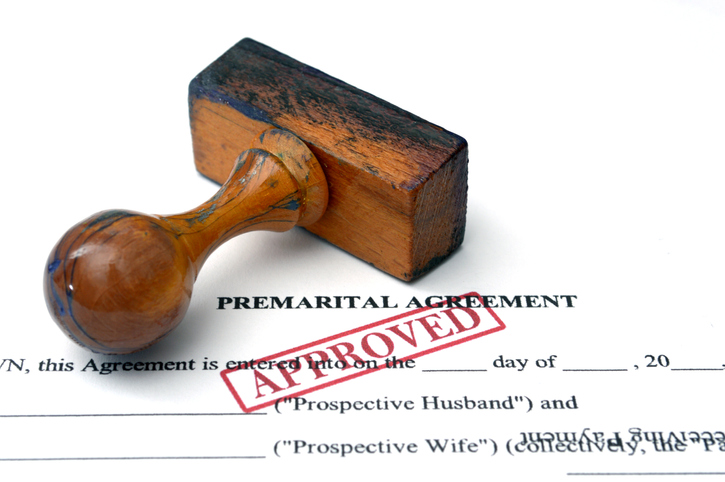 Texas is one of the few states that still recognizes “informal marriage,” also sometimes known as “common law marriage.” A party who petitions for divorce from an informal marriage often must prove the existence of the informal marriage in the first place. To prove there was an informal marriage, the party must show the couple had an agreement to be married, subsequently lived as spouses together in Texas, and represented themselves as married. Tex. Fam. Code Ann. § 2.401. Furthermore, all of these elements must occur at the same time. Evidence of an informal marriage may include evidence the parties addressed each other as spouses, conducted themselves as married people, or lived together. Evidence that the parties lived together and represented themselves as married is not alone sufficient to establish the existence of an agreement to be married.
Texas is one of the few states that still recognizes “informal marriage,” also sometimes known as “common law marriage.” A party who petitions for divorce from an informal marriage often must prove the existence of the informal marriage in the first place. To prove there was an informal marriage, the party must show the couple had an agreement to be married, subsequently lived as spouses together in Texas, and represented themselves as married. Tex. Fam. Code Ann. § 2.401. Furthermore, all of these elements must occur at the same time. Evidence of an informal marriage may include evidence the parties addressed each other as spouses, conducted themselves as married people, or lived together. Evidence that the parties lived together and represented themselves as married is not alone sufficient to establish the existence of an agreement to be married.
In a recent case, an alleged husband challenged the court’s finding of the existence of an informal marriage. The parties moved to Texas from Colorado with the alleged wife’s two children in 1985. They separated in early 2012. In 2015, the alleged wife filed a trespass to try title suit, claiming joint ownership in real property due to an informal marriage. That lawsuit was consolidated with her subsequent divorce action.
The trial court ultimately found the parties had been in an informal marriage. The court granted a divorce and divided their property. The husband appealed, arguing there was insufficient evidence to support the existence of an informal marriage.
 Texas Divorce Attorney Blog
Texas Divorce Attorney Blog


































 A court should consider a number of factors in deciding a Texas custody case. Even when the court determines the parents should be joint managing conservators, the court does not have to award equal periods of possession and access to the child to each parent. Tex. Fam. Code § 153.135. Under Texas law, there is a rebuttable presumption that the standard possession order serves the child’s best interests. Tex. Fam. Code § 153.252. A father recently
A court should consider a number of factors in deciding a Texas custody case. Even when the court determines the parents should be joint managing conservators, the court does not have to award equal periods of possession and access to the child to each parent. Tex. Fam. Code § 153.135. Under Texas law, there is a rebuttable presumption that the standard possession order serves the child’s best interests. Tex. Fam. Code § 153.252. A father recently  Under federal law, a court may not treat military disability benefits as community property for purposes of property distribution in a Texas divorce case. A husband
Under federal law, a court may not treat military disability benefits as community property for purposes of property distribution in a Texas divorce case. A husband  In a Texas divorce, a jury may decide issues regarding the characterization and valuation of property, but the judge is responsible for actually dividing the community property in a just and right manner. The court may consider a number of factors, including fault, education, ages and physical conditions, financial conditions, and the amount of separate property. Generally, the court must hold an evidentiary hearing or trial, unless the parties agree on the property division.
In a Texas divorce, a jury may decide issues regarding the characterization and valuation of property, but the judge is responsible for actually dividing the community property in a just and right manner. The court may consider a number of factors, including fault, education, ages and physical conditions, financial conditions, and the amount of separate property. Generally, the court must hold an evidentiary hearing or trial, unless the parties agree on the property division. A Texas custody order may only be modified in certain circumstances. The parents may agree to change the order. The court may order modification if the child is at least twelve years old and wants to change which parent has primary custody. Otherwise, the parent seeking the modification must generally show that there has been a material and substantial change in the circumstances of the child or a parent since the current order was rendered. The court must consider the facts and circumstances of the specific case to determine if there has been a material and substantial change in circumstances. Common situations that may lead to a material and substantial change in circumstances include marriage, a change in employment, or relocation of a parent’s primary residence. Courts have also recognized changes related to the relationship between the parent and child, including abuse, mistreatment, or “poisoning the child’s mind.” In all cases, the modification must be in the child’s best interest.
A Texas custody order may only be modified in certain circumstances. The parents may agree to change the order. The court may order modification if the child is at least twelve years old and wants to change which parent has primary custody. Otherwise, the parent seeking the modification must generally show that there has been a material and substantial change in the circumstances of the child or a parent since the current order was rendered. The court must consider the facts and circumstances of the specific case to determine if there has been a material and substantial change in circumstances. Common situations that may lead to a material and substantial change in circumstances include marriage, a change in employment, or relocation of a parent’s primary residence. Courts have also recognized changes related to the relationship between the parent and child, including abuse, mistreatment, or “poisoning the child’s mind.” In all cases, the modification must be in the child’s best interest. The trial court in a Texas family law case has only a limited ability to change its judgment once its plenary power expires. Generally, plenary power lasts for thirty days from the date the final judgment is signed, but it may be extended if the court overrules certain motions or modifies the judgment while it still has plenary power.
The trial court in a Texas family law case has only a limited ability to change its judgment once its plenary power expires. Generally, plenary power lasts for thirty days from the date the final judgment is signed, but it may be extended if the court overrules certain motions or modifies the judgment while it still has plenary power. Retirement benefits can be a complex and contentious issue in a Texas divorce case. Generally, any income earned during marriage is considered community property unless proven to be separate property, including funds contributed to a retirement account or earned as pension benefits. In a recent case, a husband
Retirement benefits can be a complex and contentious issue in a Texas divorce case. Generally, any income earned during marriage is considered community property unless proven to be separate property, including funds contributed to a retirement account or earned as pension benefits. In a recent case, a husband  A parent’s behavior may affect their rights to access and possession of their child in a Texas custody case. In a recent case, the trial court’s order provided that the schedule would change if the child had a certain number of unexcused absences or instances of tardiness while in the mother’s care.
A parent’s behavior may affect their rights to access and possession of their child in a Texas custody case. In a recent case, the trial court’s order provided that the schedule would change if the child had a certain number of unexcused absences or instances of tardiness while in the mother’s care. In a Texas divorce case, property acquired during the marriage is presumed to be community property. A spouse claiming property is their separate property must show that it is separate by clear and convincing evidence. Separate property is generally property that is owned before the marriage, property that the spouse acquired as a gift or inheritance, or property recovered as damages in a personal injury case. Community property is generally property acquired after the marriage that is not characterized as separate property.
In a Texas divorce case, property acquired during the marriage is presumed to be community property. A spouse claiming property is their separate property must show that it is separate by clear and convincing evidence. Separate property is generally property that is owned before the marriage, property that the spouse acquired as a gift or inheritance, or property recovered as damages in a personal injury case. Community property is generally property acquired after the marriage that is not characterized as separate property.